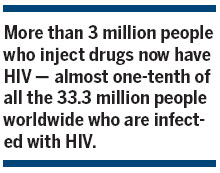Health
Boost routine testing of drug users to prevent spread of AIDS
Updated: 2010-12-01 09:16
(China Daily)
The spread of HIV and AIDS among millions of people could be slowed if addicts who inject drugs are treated as medical patients rather than as criminals, says the International Federation of the Red Cross.
More than 80 percent of the world's governments "are inclined to artificial realities, impervious to the evidence that treating people who inject drugs as criminals is a failed policy that contributes to the spread of HIV", it says.
An estimated 16 million people worldwide inject drugs, mainly because it delivers the fastest, most intense high, in what has become a growing trend on every continent, according to the Red Cross.
The launch of the 24-page report of the International Federation of the Red Cross (IFRC) - essentially to promote a new strategy for nations to stop the spread of the virus among injecting drug users - came a week before World AIDS Day on Dec 1.
The federation, which represents national Red Cross chapters in almost every country of the world, suggests ways to lessen the risk that addicts will contract the virus from tainted blood transmitted through shared needles.
It also points out that many of the addicts are selling sex to pay for their habits, which "massively increases the likelihood of spreading HIV to an unsuspecting public".
More than 3 million people who inject drugs now have HIV - almost one-tenth of all the 33.3 million people worldwide who are infected with HIV.

In the United States, about 56,000 people, many of them injecting drug users, become infected each year, a rate that has held steady for about a decade. But many of those who are infected don't know it and spread the virus unwittingly, according to the Centers for Disease Control and Prevention.
For years the US-based organization has recommended routine testing, mainly for intravenous drug users and other people at high risk. If new infections are discovered early enough, HIV patients can be treated with drugs potent enough to postpone the slide into full-blown AIDS.
Meanwhile, the Red Cross report says China, Malaysia, Russia, Ukraine and Vietnam have "mega-epidemics" of injecting drug use. In some countries, such as Russia, Georgia and Iran, drug-injecting users account for more than 60 percent of HIV infections.
The Red Cross calls the increasing rate of HIV infection among drug users who use needles "a public health emergency" and recommends more governments provide health services such as substitute drug therapy and clean needle and syringe exchanges.
It says studies consistently show that needle exchanges can lower transmission rates by as much as 42 percent.
"The IFRC is focusing on injecting drug users because a growing body of evidence shows that failing to reach them with hard reduction programs not only jeopardizes their own health, but also the safety of the public at large," says Tadateru Konoe, the group's president.
The Geneva-based United Nations' AIDS agency says that the global AIDS epidemic among the general population has slowed, with a 20 percent decrease in new HIV infections over the past decade.
But that agency's report also notes there are still 7,000 new infections each day - a rate that means two people are becoming infected with the virus for every one who is starting treatment.
E-paper

Ear We Go
China and the world set to embrace the merciful, peaceful year of rabbit
Carrefour finds the going tough in China
Maid to Order
Striking the right balance
Specials

Mysteries written in blood
Historical records and Caucasian features of locals suggest link with Roman Empire.

Winning Charm
Coastal Yantai banks on little things that matter to grow

New rules to hit property market
The State Council launched a new round of measures to rein in property prices.
